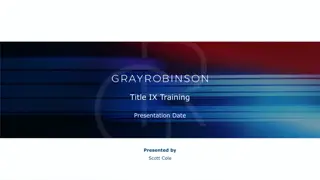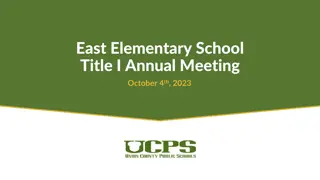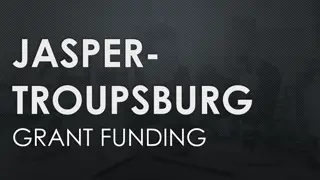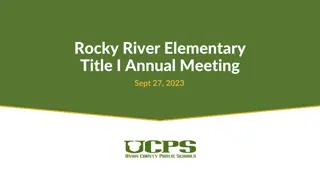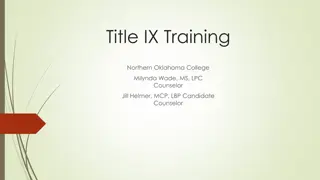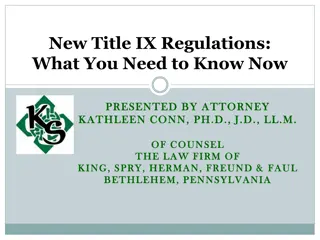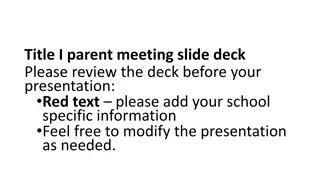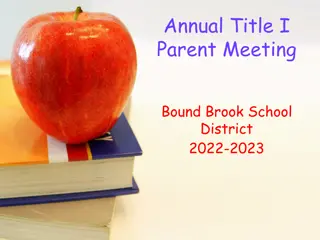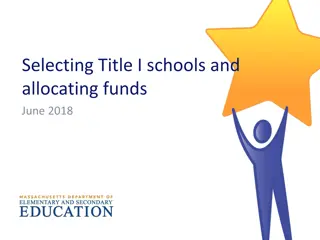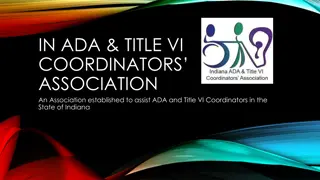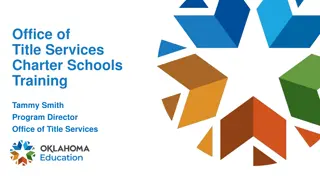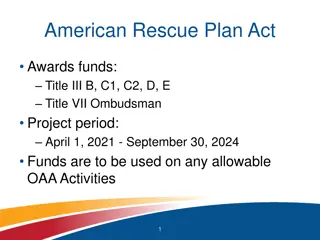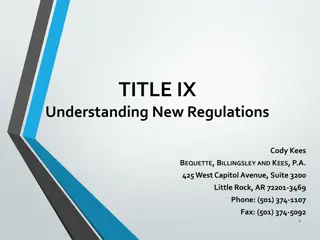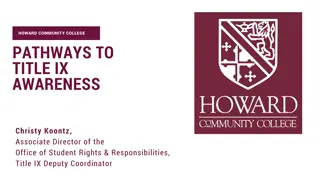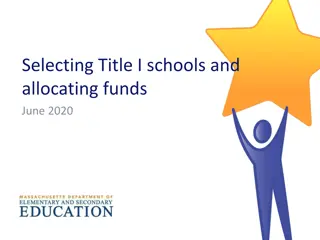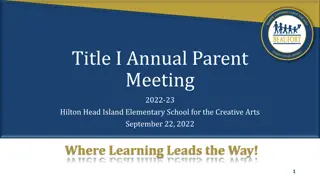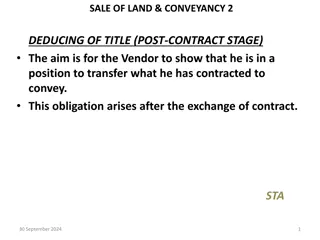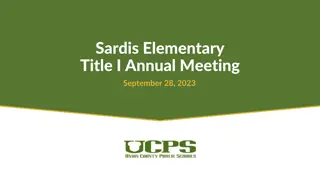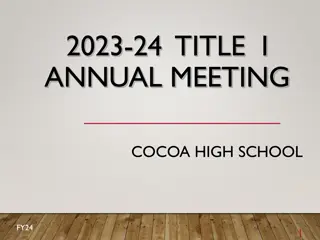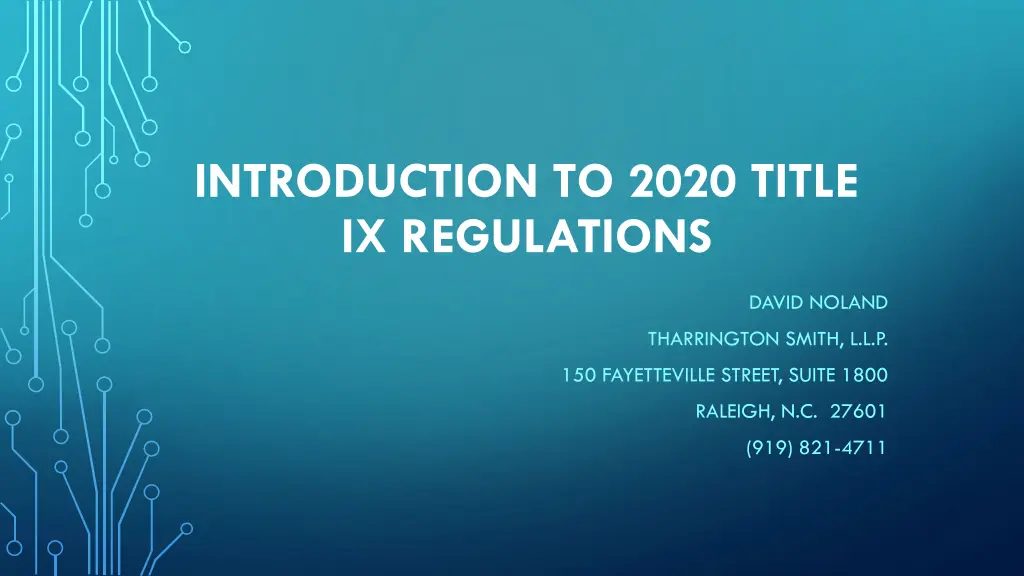
Understanding 2020 Title IX Regulations Overview
Explore the key components of the 2020 Title IX regulations, including the definition of sexual harassment, school district obligations, and district obligations. Gain insights into the changes in defining sexual harassment and the responsibilities of educational institutions under the new regulations.
Download Presentation

Please find below an Image/Link to download the presentation.
The content on the website is provided AS IS for your information and personal use only. It may not be sold, licensed, or shared on other websites without obtaining consent from the author. If you encounter any issues during the download, it is possible that the publisher has removed the file from their server.
You are allowed to download the files provided on this website for personal or commercial use, subject to the condition that they are used lawfully. All files are the property of their respective owners.
The content on the website is provided AS IS for your information and personal use only. It may not be sold, licensed, or shared on other websites without obtaining consent from the author.
E N D
Presentation Transcript
INTRODUCTION TO 2020 TITLE IX REGULATIONS DAVID NOLAND THARRINGTON SMITH, L.L.P. 150 FAYETTEVILLE STREET, SUITE 1800 RALEIGH, N.C. 27601 (919) 821-4711
BACKGROUND Title IX: 20 U.S.C. 1681 et seq. No person in the United States shall, on the basis of sex, be excluded from participation in, be denied the benefits of, or be subjected to discrimination under any education program or activity receiving Federal financial assistance. Regulations prescribed by U.S. Dept. of Education pursuant to the law. Final Rule containing new regulations issued by DOE on May 6, 2020. Regulations only address sexual harassment. Implementation date of new regulations was August 14, 2020. Currently several lawsuits pending seeking to halt the regulations.
OVERVIEW OF MAJOR COMPONENTS Definition of sexual harassment School district obligations Formal complaint and parties defined Required response to formal complaint
SEXUAL HARASSMENT DEFINED Conduct on the basis of sex occurring in a school system education program or activity that satisfies one or more of the following: Quid pro quo An employee of the school system conditioning the provision of an aid, benefit, or service of the school system on an individual s participation in unwelcome sexual conduct; VAWA Big four sexual assault, dating violence, domestic violence, or stalking; or Unwelcome conduct determined by a reasonable person to be so severe, pervasive, and objectively offensive that it effectively denies a person equal access to the school system s education program or activities.
SEXUAL HARASSMENT DEFINED Prior definition was unwelcome conduct that was severe, pervasive, or persistent and that interfered with or limited a student s ability to participate in or benefit from school services, activities, or opportunities. New definition is unwelcome conduct that is so severe, pervasive, and objectively offensive that it effectively denies a person s equal access to the education program or activity. Narrower definition of sexual harassment. Isolated incidents likely will not meet definition.
DISTRICT OBLIGATIONS A recipient with actual knowledge of sexual harassment in an education program or activity against a person in the United States must respond promptly and in a manner that is not deliberately indifferent. Actual knowledge Notice of sexual harassment or allegations of sexual harassment to Title IX Coordinator, an official who has authority to institute corrective measures, or any employee of an elementary or secondary school. Prior guidance triggered the obligation if the recipient knew or should have known. Deliberate indifference Failure to respond reasonably in light of known circumstances. District must take some steps to inquire about any report or allegation.
DISTRICT OBLIGATIONS Obligation is triggered by a report or allegation of sexual harassment made to any employee. Any report or allegation should be immediately brought to the attention of the Title IX Coordinator. Staff should not attempt to address issues informally without consulting with administrators and Title IX Coordinator.
PARTIES Complainant person alleged to be the victim of sexual harassment. Not a third party who reports alleged sexual harassment against someone else. Respondent a person alleged to be the perpetrator of conduct that could constitute sexual harassment.
REPORTS OF SEXUAL HARASSMENT AND FORMAL COMPLAINTS A report of alleged sexual harassment may be made by anyone, and it can be oral, telephonic, written, or email. A report triggers the obligation for the district to not be deliberately indifferent. A Formal Complaint must be in writing, and can only be made by the complainant (the person alleged to be the victim), or by the Title IX Coordinator. A Formal Complaint triggers a defined process, with certain requirements prescribed by the regulations.
INTERSECTION WITH OTHER SCHOOL POLICIES Defined procedures apply only to investigation and adjudication of alleged sexual harassment under Title IX. Schools may continue to take disciplinary action against students/employees outside of defined procedures if their conduct violates other board policy or Code of Student Conduct. Important to be clear about alleged violations and procedure.
INITIAL RESPONSE Title IX Coordinator must contact the complainant upon receipt of a report or a Formal Complaint. Discuss availability of supportive measures Consider Complainant s wishes with respect to supportive measures Inform the Complainant of the availability of supportive measures Explain the process for filing a Formal Complaint Must treat parties equitably, including with respect to provision of supportive measures. Must follow grievance process before imposing discipline or sanction on respondent based on sexual harassment.
SUPPORTIVE MEASURES Non-disciplinary, non-punitive, individualized services offered as appropriate, as reasonably available, and without fee or charge to the complainant or the respondent. Before or after filing of a formal complaint, or if no formal complaint is filed. Designed to restore or preserve equal access to the recipient s education program or activity without unreasonably burdening the other party. Examples: Counseling Course modifications Schedule changes Increased monitoring or supervision Cannot be punitive or disciplinary.
FORMAL COMPLAINT PROCESS: OVERVIEW Regulations prescribe specific procedures with respect to the initial steps taken upon receipt of a Formal Complaint, the investigation, the determination of responsibility, and any appeal rights. Title IX Coordinator will receive Formal Complaint and oversee process from beginning to end. Several areas where procedures may differ from previous practice.
FORMAL COMPLAINT PROCESS: GENERAL ELEMENTS OF GRIEVANCE PROCESS Must treat parties equitably Must objectively evaluate all evidence No conflict of interest for investigator or decisionmakers Presumption that respondent is not responsible Reasonably prompt time frames Description of potential discipline Standard used preponderance or clear & convincing Standard must be the same for all Formal Complaints Description of supportive measures available and of appeal procedures and bases No breach of legally recognized privilege (e.g. attorney/client) absent a waiver
FORMAL COMPLAINT PROCESS: INITIAL RESPONSE Written notice to known parties Must allow respondent sufficient time to prepare a response before initial interview Must include notice of allegations, including sufficient detail to allow respondent to prepare a response (including known identities of the parties, date/location, and alleged conduct). Other required elements in written notice, including notice of parties rights
FORMAL COMPLAINT PROCESS: GROUNDS FOR DISMISSAL Dismissals of a Formal Complaint are mandatory on three grounds: 1. The conduct, if true, would not constitute sexual harassment 2. Conduct did not occur in the school system s education program or activities 3. Conduct did not occur against a person in the United States Permissive dismissal on other grounds, though typically not prior to commencement of investigation If complaint is dismissed, the conduct may still be addressed under other code of conduct provisions if it would constitute a violation
FORMAL COMPLAINT PROCESS: INFORMAL RESOLUTION Allowed at any time during formal process if both parties provide written, voluntary consent. May not be offered unless a formal complaint is filed. May not be required as a condition of enrollment, employment, or any other right. May not be used if allegation is that an employee sexually harassed a student. Board policy will determine if information resolution is an option, and if so, what form it will take.
FORMAL COMPLAINT PROCESS: INVESTIGATION Investigator must be neutral and objective. District policy will determine investigators. Likely to be school administrators for student respondents, and HR administrator(s) for staff respondents. Investigator is responsible for gathering evidence to reach a determination Burden of gathering evidence is on school system, not on complainant or respondent Neither party shall be restricted from gathering/presenting relevant evidence or discussing allegations under investigation Both parties must have an equal opportunity to present witnesses and evidence Investigator must interview all individuals who may have relevant information
FORMAL COMPLAINT PROCESS: INVESTIGATION Both parties must have an equal opportunity to inspect and review any evidence obtained as part of the investigation Prior to completing investigatory report, each party must receive the evidence collected which is directly related to the allegations (even if not intended to be relied on in making determination) and be given at least 10 days to submit a written response
FORMAL COMPLAINT PROCESS: INVESTIGATIVE REPORT The investigator must prepare a written investigative report that fairly summarizes the relevant evidence Must be provided to parties at least 10 days prior to hearing or other determination of responsibility Parties are given an opportunity to submit written response to investigative report
FORMAL COMPLAINT PROCESS: QUESTIONS & ANSWERS Following receipt of investigative report, parties must have opportunity to submit written, relevant questions to be asked of another party or witness Responsibility of the district to obtain answers and provide to both parties Must permit additional, limited follow-up questions from each party This step is required with or without a live hearing
FORMAL COMPLAINT PROCESS: HEARINGS Required for higher education, but optional for K-12 District should consider how to harmonize with other disciplinary procedures (e.g. long-term suspension appeal hearings) Consider also staff respondents vs. student respondents Both parties must have equal right to request hearing and participate
FORMAL COMPLAINT PROCESS: DETERMINATION OF RESPONSIBILITY Decisionmaker(s) cannot be the same as investigator(s) and cannot be Title IX Coordinator Standard used must be the same for all Formal Complaints Policy should establish the procedure for imposing discipline (e.g. recommendation to the Board if needed)
FORMAL COMPLAINT PROCESS: DETERMINATION OF RESPONSIBILITY Written determination must include: Identification of allegations Description of procedural steps Findings of fact supporting the determination Conclusions regarding application of policy/Code of Student Conduct to the facts Statement of, and rationale for, the result as to each allegation, including determination of responsibility, any disciplinary sanctions, whether remedies designed to restore or preserve equal access to education program and activities will be provided to complainant Procedures and permissible bases for appeal
FORMAL COMPLAINT PROCESS: APPEALS Prior OCR guidance did not require appeals New regulations require appeals for both parties, from dismissals or final determinations, in three circumstances: Procedural irregularity New evidence Conflict of interest/bias for Title IX coordinator, investigator, or decisionmaker Appeals may be offered on any other basis, but must be available to both parties equally District should consider appeal procedures and what actions to take if appeal grounds are substantiated
FORMAL COMPLAINT PROCESS: DISCIPLINE AND REMEDIES Disciplinary consequences should be imposed in accordance with policy and Code of Student Conduct Even if sexual harassment is not established, district can take appropriate disciplinary action for other violations of policy or Code of Student Conduct Important to be clear about bases for discipline, procedure, and what violations are established School administrators should work with Title IX Coordinator If respondent is employee, conduct may also be subject to Title VII standard for workplace harassment Title IX Coordinator is responsible for implementation of any remedies Should work with decisionmaker to determine appropriate remedies to be provided to complainant
RETALIATION PROHIBITED Regulations specifically prohibit retaliation for the purpose of interfering with any right/privilege secured by Title IX, or because the person has been a part of Title IX investigation/proceeding Retaliation can include charging code violation for same facts or circumstances, if done for the purposes above Example given by DOE in higher education context is charging complainant with alcohol violation
RECORDKEEPING Records must be maintained for a minimum of 7 years, including investigative records, disciplinary sanctions, remedies, appeals, and any actions taken, including supportive measures Must document why response was not deliberately indifferent If supportive measures were not provided to complainant, must document why that was not clearly unreasonable Requirements apply to both reports and Formal Complaints Title IX Coordinator must also maintain all training materials for 7 years, and must make them publicly available
QUESTIONS? Call David Noland at (919) 821-4711 Or email questions to: dnoland@tharringtonsmith.com

